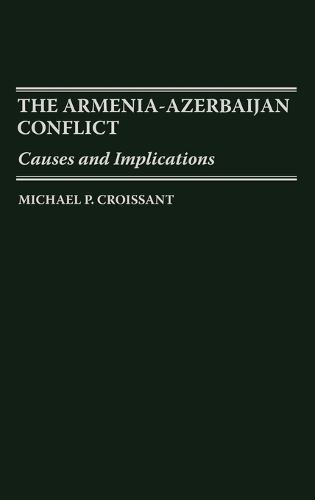
The Armenia-Azerbaijan Conflict: Causes and Implications
(Hardback)
Publishing Details
The Armenia-Azerbaijan Conflict: Causes and Implications
By (Author) Michael P. Croissant
Bloomsbury Publishing PLC
Praeger Publishers Inc
23rd July 1998
United States
Classifications
Tertiary Education
Non Fiction
International relations
Political economy
327.475604754
Physical Properties
Hardback
192
Width 156mm, Height 235mm
482g
Description
Of all the violent disputes that have flared across the former Soviet Union since the late 1980s, the Armenia-Azerbaijan conflict is the only one to pose a genuine threat to peace and security throughout Eurasia. By right of its strategic location and oil resources, the Transcaucasus has been and will continue to be a source of interest for external powers competing to advance their geopolitical influence in the region. Under such conditions, the possibility will remain for the Armenia-Azerbaijan conflict to reignite and expand to include other powers. The ten-year conflict between Armenia and Azerbaijan has been one of the bloodiest and most intractable disputes to emerge from the breakup of the Soviet Union. Animosity that developed between the Armenians and Azeris under czarist Russian rule was fueled by the rise of a dispute over Nagorno-Karabakh, a mountainous region for which both peoples feel an intense nationalistic affinity. The attachment of the region to Azerbaijan by Stalin in 1923 became a source of deep resentment for the Armenians, and during the rule of Gorbachev, a campaign was begun to achieve the peaceful unification of Armenia and Karabakh. Azerbaijan resisted the move as a threat to its territorial integrity, and clashes that broke out soon escalated into a full-scale war that outlived the USSR itself. Although a cease-fire has been observed since May, 1994, a peaceful settlement to the conflict has been elusive. Meanwhile, by right of both the strategic location and resources and the unique security characteristics of the Transcaucasus, major external powersRussia, Turkey, and Iranhave sought to influence the dispute according to their geopolitical interests. With the growth of interest in the oil riches of the Caspian Sea and the increasing engagement of Western countries, including the United States, the risks and implications of renewed violence between Armenia and Azerbaijan will grow. This major study will be of interest to students, scholars, and policymakers involved with international relations, military affairs, and the Transcaucasus.
Reviews
"It is a well written and well organised survey of the history of the conflict, which makes good use of the available secondary sources....[A] welcome synthesis of much of the existing literature on the subject, which can claime few booklength studies....Croissant's book is an excellent survey which will give readers unfamiliar with the Karabakh dispute a working knowledge of the major issues and players."-Survival
Croissant's exhaustively footnoted study provides a real perspective to the conflict in the Caucasus.-Defense & Foreign Affairs Strategic Policy
It is a well written and well organised survey of the history of the conflict, which makes good use of the available secondary sources....[A] welcome synthesis of much of the existing literature on the subject, which can claime few booklength studies....Croissant's book is an excellent survey which will give readers unfamiliar with the Karabakh dispute a working knowledge of the major issues and players.-Survival
The book is written in a style pleasing to both historiographers and international relations area specialists alike. In a topic area often fraught with information distorted by the political sympathies of journalists and academics, Croissant is able to carefully extract the facts necessary to produce a detailed and theoretically sound account of a long term and highly complex socio-political conflict.-Terrorism & Politcal Violence, Vol10, #4, 1998
An interesting book with good sketches.-The journal of the United Service Institution of India
An interesting book with good sketches.The journal of the United Service Institution of India
"An interesting book with good sketches."-The journal of the United Service Institution of India
"Croissant's exhaustively footnoted study provides a real perspective to the conflict in the Caucasus."-Defense & Foreign Affairs Strategic Policy
"The book is written in a style pleasing to both historiographers and international relations area specialists alike. In a topic area often fraught with information distorted by the political sympathies of journalists and academics, Croissant is able to carefully extract the facts necessary to produce a detailed and theoretically sound account of a long term and highly complex socio-political conflict."-Terrorism & Politcal Violence, Vol10, #4, 1998
Author Bio
MICHAEL P. CROISSANT is an Earhart Fellow in the Department of Central Eurasian Studies at Indiana University. He has published numerous articles on the southern former Soviet republics in Strategic Review, Eurasian Studies, National Security Studies Quarterly, Comparative Strategy, and other journals.
